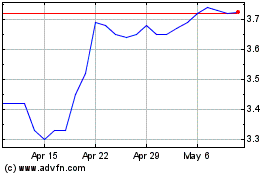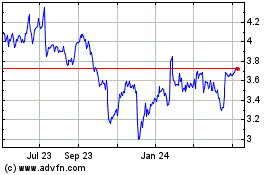INTERVIEW: Regus Set For Expansion Despite Harsh Conditions
August 27 2010 - 5:59AM
Dow Jones News
Regus PLC (RGU.LN), the world's largest provider of outsourced
office space, is preparing for another period of expansion even
though it continues to make losses amid difficult trading
conditions.
Regus is planning to open one center per day until the end of
the year as it continues to believe that flexibility is key to
future working practices. But while the company continues to sign
new contracts and customers, it has had to reduce its prices and it
took a hit as it regeared some leases negotiated a decade ago.
Chief Executive Mark Dixon played down these concerns in an
interview with Dow Jones Newswires, saying, "The economy is
challenging but we are doing quite well."
"More people will move to flexible working and the economy will
improve," he said, adding that Regus now was "trading at the bottom
point of the cycle."
Regus has some 800,000 customers paying for access to business
centers globally and virtual products to aid working from home. It
has signed new deals with companies such as Yell Group PLC's
(YELL.LN) Yell.com and General Electric Co. (GE).
It is also cooperating with giants such as Microsoft Corp.
(MSFT), Nokia Corp. (NOK) and Google Inc. (GOOG), companies that
believe in flexible working.
But its path hasn't been straightforward. The company Friday
reported its first-half results, booking a net loss of GBP7.8
million compared with net profit of GBP54.4 million in the same
period last year.
"We are being effected by the economy ... that means that people
are willing to pay less for our products, but we are still
producing very good cash and have some good things happening for
us," said Dixon.
Regus reported net cash of GBP224.2 million, largely unchanged
from the GBP229.5 million reported in the same period last
year.
"We had hoped that first-half profit would mark the low, but
this looks now unlikely. Conditions are described as challenging in
the first half, with no published outlook," said KBC Peel Hunt
analyst Andrew Shepherd-Barron.
"Perhaps the strongest indicator of the environment is that
Regus has moved back to being more aggressive on price,
understandably given that no region has mature occupancy in the
first half better than 78%," he added.
Although Dixon said that he has seen some stability on pricing,
he wouldn't say by how much prices have been cut or where.
Regus, which leases space from developers and repackages it to
sell to clients in various forms, signed expensive leases 10 years
ago, which were weighing on the company.
The company revealed Friday that regearing those U.K. leases has
cost it GBP15.8 million, which hit Regus' earnings, but will save
GBP12 million a year.
Dixon doesn't want to disclose where those leases are and how
much they will cost the company from now on, but assured investors
that the new regeared leases have been signed at current market
prices.
He said that the leases had to be regeared because of pricing,
not lower occupancy.
Still, Dixon sees the U.K. as a growth market. He also wants to
move further into emerging markets.
"We also see strong demand in emerging markets ... so we plan to
open many more centers there," he said, adding that at least half
the centers planned for opening will be in countries in Asia, Latin
America, Africa and Eastern Europe.
At 0900 GMT, Regus shares traded down 2 pence, or 2.8%, at 64
pence, making it one of the biggest fallers in the FTSE 250 index,
which traded up 0.2%.
-By Anita Likus, Dow Jones Newswires; +44 20 7842 9407;
anita.likus@dowjones.com
Nokia (NYSE:NOK)
Historical Stock Chart
From Mar 2024 to Apr 2024

Nokia (NYSE:NOK)
Historical Stock Chart
From Apr 2023 to Apr 2024
